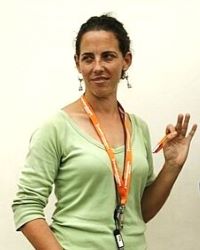Deaf in Korea, South

Photo Source:
Kate Nelson/AusAID - Wikimedia
Creative Commons
|
Send Joshua Project a map of this people group.
|
| People Name: | Deaf |
| Country: | Korea, South |
| 10/40 Window: | No |
| Population: | 180,000 |
| World Population: | 27,508,450 |
| Primary Language: | Korean Sign Language |
| Primary Religion: | Unknown |
| Christian Adherents: | 10.00 % |
| Evangelicals: | 0.00 % |
| Scripture: | Portions |
| Ministry Resources: | No |
| Jesus Film: | Yes |
| Audio Recordings: | No |
| People Cluster: | Deaf |
| Affinity Bloc: | Deaf |
| Progress Level: |
|
Introduction / History
In many situations, Deaf people are viewed as disability group, but a more accurate approach is to consider them as a distinct people group. They have their own unique languages and cultures. While many Deaf people have some degree of bilingualism, for most of them it is impossible to learn a spoken language that they cannot hear fully. It is becoming more common around the world for Deaf people to learn more than one sign language. That includes those in South Korea where there is only one sign language, but there are some dialectal differences.
What Are Their Lives Like?
The number of schools for Deaf children in South Korea is not known, but children, including the Deaf, have the opportunity to attend 18 years of schooling: kindergarten 2 years, elementary 6 years, middle school 3 years, high school 3 years, university 4 years. The kindergarten children (ages 4-5 years) live at home, but older children can stay in the dormitory (ages 6- 19), if the distance to school is too great. The school teachers emphasize oralism in the elementary classes. After 12 the age of sign language is used with continuing oral education. After high school, many of the Deaf go on to Vocational School. There are a few interpreters to help them. About 30 Korean Deaf people have gone to Gallaudet University.
What Are Their Beliefs?
The Deaf in South Korea are either Buddhist or Christian, depending on their family background. For any religious affiliation, they understand little of their faith because of the special communication needs.
What Are Their Needs?
Because of lack of access to the spoken language, many Deaf people have a difficult time participating in church services and activities; relatively little Bible translation work has been done in sign languages and interpreted church services provide only the most basic of access to the Deaf community. Just like spoken languages, sign languages are not universal and vary widely from country to country and often even within a country. For Deaf people to have full access to scripture, they need both Bible translation in their heart language and services in sign language.
For many Deaf people, the Bible is out of reach. Limited access to education makes learning a spoken language well enough to read scripture exceedingly difficult, and only a small percentage of Deaf people have access to scripture in a sign language.
The global Deaf community is very much in need of missionaries, but the best people to reach a Deaf person is another Deaf person. Providing training for Deaf leaders and Deaf missionaries is crucial.
Prayer Points
Pray for the Lord to prepare and send out Deaf missionaries to South Korea.
Pray for the Holy Spirit to prepare the hearts of Deaf people in South Korea to respond to the gospel.
Pray for many Deaf to be healed as a testimony of God's power and goodness.